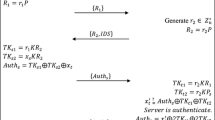Abstract
Radio frequency identification (RFID) is a wireless technology for automatic identification and data capture. Security and privacy issues in the RFID systems have attracted much attention. Many approaches have been proposed to achieve the security and privacy goals. One of these approaches is RFID authentication protocols by which a server and tags can authorize each other through an intracity process. Recently, Chou proposed a RFID authentication protocol based on elliptic curve cryptography. However, this paper demonstrates that the Chou’s protocol does not satisfy tag privacy, forward privacy and authentication, and server authentication. Based on these security and privacy problems, we also show that Chou’s protocol is defenseless to impersonation attacks, tag cloning attacks and location tracking attacks. Therefore, we propose a more secure and efficient scheme, which does not only cover all the security flaws and weaknesses of related previous protocols, but also provides more functionality. We prove the security of the proposed improved protocol in the random oracle model.



Similar content being viewed by others
References
Burmester M, Le TV, Medeiros BD, Tsudik G (2009) Universally composable RFID identification and authentication protocols. ACM Trans Inf Syst Secur (TISSEC) 12(4):21
Juels A, Weis S (2006) Defining strong privacy for RFID. Cryptology ePrint Archive, Report 2006/137
Cai S, Li Y, Li T, Deng RH (2009) Attacks and improvements to an RIFD mutual authentication protocol and its extensions. In: Proceedings of the second ACM conference on wireless network security, pp 51–58
Song B, Mitchell CJ (2011) Scalable RFID security protocols supporting tag ownership transfer. Comput Commun 34(4):556–566
Niu B, Zhu X, Chi H, Li H (2014) Privacy and authentication protocol for mobile RFID systems. Wirel Pers Commun. doi:10.1007/s11277-014-1605-6
Shao-hui W, Zhijie H, Sujuan L, Dan-wei C (2013) Security analysis of two lightweight RFID authentication protocols. Ann Telecommun. doi:10.1007/s12243-013-0361-z
Dehkordi MH, Farzaneh Y (2013) Improvement of the hash-based RFID mutual authentication protocol. Wirel Pers Commun. doi:10.1007/s11277-013-1358-7
Safkhani M, Peris-Lopez P, Hernandez-Castro JC, Bagheri N (20174) Cryptanalysis of the Cho et al. protocol: a hash-based RFID tag mutual authentication protocol. J Comput Appl Math 259(1):571–577
Alagheband MR, Aref MR (2013) Simulation-based traceability analysis of RFID authentication protocols. Wirel Pers Commun. doi:10.1007/s11277-013-1552-7
Chen CL, Huang YC, Shih TF (2012) A novel mutual authentication scheme for RFID conforming EPCglobal class 1 generation 2 standards. Inf Technol Control 41(3):220–228
Kuo WC, Chen BL, Wuu LC (2013) Secure indefinite-index RFID authentication scheme with challenge-response strategy. Inf Technol Control 42(2):124–130
Alagheband MR, Aref MR (2013) Unified privacy analysis of newfound RFID authentication protocols. Secur Commun Netw 6(8):999–1009
Hein D, Wolkerstorfer J, Felber N (2009) ECC is ready for RFID—a proof in silicon. Sel Areas Cryptogr LNCS 5381:401–413
Lee YK, Sakiyama K, Batina L, Verbauwhede I (2008) Elliptic curve based security processor for RFID. IEEE Trans Comput 57(11):1514–1527
N.N.I., Technology of Standards: Cryptographic hash algorithm competition. http://csrc.nist.gov/groups/ST/hash/sha-3/index.html
Ning H, Liu H, Mao J, Zhang Y (2011) Scalable and distributed key array authentication protocol in radio frequency identification-based sensor systems. IET Commun 5(12):1755–1768
Alomair B, Clark A, Cuellar J, Poovendran R (2012) Scalable RFID systems: a privacy-preserving protocol with constant-time identification. IEEE Trans Parallel Distrib Syst 23(8):1536–1550
Alomair B, Poovendran R (2010) Privacy versus scalability in radio frequency identification systems. Comput Commun 33(18):2155–2163
Song B, Mitchell CJ (2011) Scalable RFID security protocols supporting tag ownership transfer. Comput Commun 34(4):556–566
Batina L, Lee YK, Seys S, Singele D, Verbauwhede I (2012) Extending ECC-based RFID authentication protocols to privacy-preserving multi-party grouping proofs. Pers Ubiquitous Comput 16(3):323–335
Chou JS (2013) An efficient mutual authentication RFID scheme based on elliptic curve cryptography. J Supercomput. doi:10.1007/s11227-013-1073-x
Tuyls P, Batina L (2006) RFID-tags for anti-counterfeiting. In: Topics in Cryptology (CT-RSA’06), LNCS 3860, pp 115–131
Schnorr CP (1990) Efficient identification and signatures for smart cards. In: Advances in cryptology (CRYPTO’89), pp 239–252
Batina L, Guajardo J, Kerins T, Mentens N, Tuyls P, Verbauwhede I (2007) Public-key cryptography for RFID-tags. In: Fifth annual IEEE international conference on pervasive computing and communications workshops, 2007. (PerCom Workshops’07), pp 217–222
Okamoto T (1993) Provably secure and practical identification schemes and corresponding signature schemes. In: Advances in Cryptology (CRYPTO’92), pp 31–53
Lee YK, Batina L, Verbauwhede I (2008) EC-RAC (ECDLP based randomized access control): provably secure RFID authentication protocol. In: IEEE international conference on RFID, pp 97–104
O’Neill M, Robshaw MJ (2010) Low-cost digital signature architecture suitable for radio frequency identification tags. Comput Digital Tech IET 4(1):14–26
Godor G, Giczi N, Imre S (2010) Elliptic curve cryptography based mutual authentication protocol for low computational capacity RFID systems-performance analysis by simulations. In: IEEE international conference on wireless communications, networking and information security (WCNIS), pp 650–657
Farash MS, Bayat M, Attari MA (2011) Vulnerability of two multiple-key agreement protocols. Comput Electr Eng 37(2):199–204
Farash MS, Attari MA, Bayat M (2012) A certificateless multiple-key agreement protocol without one-way hash functions based on bilinear pairings. IACSIT Int J Eng Technol 4(3):321–325
Farash MS, Attari MA, Atani RE, Jami M (2013) A new efficient authenticated multiple-key exchange protocol from bilinear pairings. Comput Electr Eng 39(2):530–541
Farash MS, Attari MA (2013) Provably secure and efficient identity-based key agreement protocol for independent PKGs using ECC. ISC Int J Inf Secur 5(1):1–15
Farash MS, Attari MA (2014) A pairing-free ID-based key agreement protocol with different PKGs. Int J Netw Secur 16(2):143–148
Farash MS, Attari MA (2014) An enhanced and secure three-party password-based authenticated key exchange protocol without using server’s public-keys and symmetric cryptosystems. Inf Technol Control 43(2):143–150
Niu B, Zhu X, Chi H, Li H (2014) Privacy and authentication protocol for mobile RFID systems. Wirel Pers Commun. doi:10.1007/s11277-014-1605-6
Author information
Authors and Affiliations
Corresponding author
Rights and permissions
About this article
Cite this article
Farash, M.S. Cryptanalysis and improvement of an efficient mutual authentication RFID scheme based on elliptic curve cryptography. J Supercomput 70, 987–1001 (2014). https://doi.org/10.1007/s11227-014-1272-0
Published:
Issue Date:
DOI: https://doi.org/10.1007/s11227-014-1272-0




